| Listing 1 - 10 of 10 |
Sort by
|
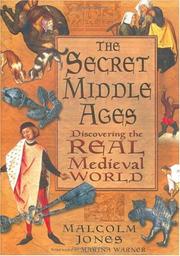
ISBN: 0275979806 Year: 2003 Publisher: Westport (Conn.): Praeger
Abstract | Keywords | Export | Availability | Bookmark
 Loading...
Loading...Choose an application
- Reference Manager
- EndNote
- RefWorks (Direct export to RefWorks)
Art, Medieval --- Civilization, Secular, in art --- Themes, motives
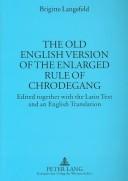
ISBN: 3631394934 0820459747 9783631394939 9780820459745 Year: 2003 Volume: 26. Publisher: Frankfurt am Main Lang
Abstract | Keywords | Export | Availability | Bookmark
 Loading...
Loading...Choose an application
- Reference Manager
- EndNote
- RefWorks (Direct export to RefWorks)
Monasticism and religious orders --- Monachisme et ordres religieux --- Rules. --- Règles --- Chrodegang, --- Altenglisch. --- English language --- English language. --- Monasticism and religious orders. --- Übersetzung. --- Old English. --- Chrodegang --- Chrodegangus, --- Regula canonicorum. --- Regula canonicorum (Chrodegang, Saint, Bishop of Metz). --- 450 - 1100. --- Règles --- Canons, Cathedral, collegiate, etc --- Religious life --- History --- Canons, Secular --- Cathedral canons --- Church canons --- Residentiary canons --- Secular canons --- Chapters, Cathedral, collegiate, etc. --- Clergy
Book
ISSN: 16393325 ISBN: 2747550915 9782747550918 Year: 2003 Publisher: Paris L'Harmattan
Abstract | Keywords | Export | Availability | Bookmark
 Loading...
Loading...Choose an application
- Reference Manager
- EndNote
- RefWorks (Direct export to RefWorks)
Secularization (Theology) --- Church and state --- Theology, Doctrinal --- Politics and Religion - Secularism --- Secular theology --- Christianity and state --- Separation of church and state --- State and church --- Death of God theology --- Secularism --- State, The --- Congresses --- Secularization (Theology) - Congresses --- Church and state - France - Congresses --- Theology, Doctrinal - Congresses --- laïcité --- histoire --- la France
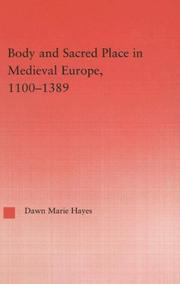
ISBN: 0415988381 0203009061 9780203009062 9780415988384 9786610142088 6610142084 9781135860042 1135860041 9781135859992 113585999X 9781135860035 1135860033 9780415803526 0415803527 1280142081 Year: 2003 Volume: 18 Publisher: New York Routledge
Abstract | Keywords | Export | Availability | Bookmark
 Loading...
Loading...Choose an application
- Reference Manager
- EndNote
- RefWorks (Direct export to RefWorks)
Body and Sacred Place in Medieval Europe investigates the medieval understanding of sacred place, arguing for the centrality of bodies and bodily metaphors to the establishment, function, use, and power of medieval churches. Questioning the traditional division of sacred and profane jurisdictions, this book identifies the need to consider non-devotional uses of churches in the Middle Ages. Dawn Marie Hayes examines idealized visions of medieval sacred places in contrast with the mundane and profane uses of these buildings. She argues that by the later Middle Ages-as loyalties were tor
History of Europe --- Christian church history --- anno 1200-1299 --- anno 1100-1199 --- anno 1300-1399 --- Sacred space --- Church buildings --- Human body --- Lieux sacrés --- Eglises --- Corps humain --- History --- Religious aspects --- Christianity --- Histoire --- Aspect religieux --- Christianisme --- Europe --- Church history --- Histoire religieuse --- Secular use --- History of doctrines --- Lieux sacrés --- Holy places --- Places, Sacred --- Sacred places --- Sacred sites --- Sacred spaces --- Sites, Sacred --- Space, Sacred --- Holy, The --- Religion and geography --- Body, Human --- Human beings --- Body image --- Human anatomy --- Human physiology --- Mind and body --- Churches --- Buildings --- Church facilities --- Church architecture --- Sacred space - Europe - History - To 1500 --- Church buildings - Secular use - Europe - History - To 1500 --- Human body - Religious aspects - Christianity - History of doctrines - Middle Ages, 600-1500 --- Thomas ep. Cantuariensis m. --- Chartres --- Notre-Dame (Chartres)
Book
ISBN: 1400889316 9781400889310 9780691116693 Year: 2003 Publisher: Princeton, N.J. Princeton University Press
Abstract | Keywords | Export | Availability | Bookmark
 Loading...
Loading...Choose an application
- Reference Manager
- EndNote
- RefWorks (Direct export to RefWorks)
Many historical processes are dynamic. Populations grow and decline. Empires expand and collapse. Religions spread and wither. Natural scientists have made great strides in understanding dynamical processes in the physical and biological worlds using a synthetic approach that combines mathematical modeling with statistical analyses. Taking up the problem of territorial dynamics--why some polities at certain times expand and at other times contract--this book shows that a similar research program can advance our understanding of dynamical processes in history. Peter Turchin develops hypotheses from a wide range of social, political, economic, and demographic factors: geopolitics, factors affecting collective solidarity, dynamics of ethnic assimilation/religious conversion, and the interaction between population dynamics and sociopolitical stability. He then translates these into a spectrum of mathematical models, investigates the dynamics predicted by the models, and contrasts model predictions with empirical patterns. Turchin's highly instructive empirical tests demonstrate that certain models predict empirical patterns with a very high degree of accuracy. For instance, one model accounts for the recurrent waves of state breakdown in medieval and early modern Europe. And historical data confirm that ethno-nationalist solidarity produces an aggressively expansive state under certain conditions (such as in locations where imperial frontiers coincide with religious divides). The strength of Turchin's results suggests that the synthetic approach he advocates can significantly improve our understanding of historical dynamics.
Historiometry. --- History --- Historical models --- Historiometry --- Historiometrics --- Biography --- Psychohistory --- Mathematical models. --- Methodology --- Psychological aspects --- Mathematical models --- Statistical methods --- Demography --- Asia Minor. --- Black Death. --- English Revolution. --- Europe. --- France. --- Russia. --- agrarian polities. --- asabiya. --- autocatalytic model. --- boom–bust dynamics. --- boundless growth. --- class structure. --- cliodynamics. --- collective solidarity. --- collectivism. --- commoners. --- conflict legitimacy dynamics. --- cultural regions. --- demographic-fiscal model. --- demographic-structural theory. --- dynamical processes. --- elites. --- empires. --- endogenous systems. --- equilibrium. --- ethnic assimilation. --- ethnic identity. --- ethnies. --- ethnogenesis. --- ethnokinetic model. --- ethnokinetics. --- frontier index. --- frontiers. --- geopolitics. --- group dynamics. --- group solidarity. --- hierarchical modeling. --- historical dynamics. --- historical sociology. --- imperial boundaries. --- individualism. --- internal warfare. --- linguistic assimilation. --- marchland position. --- mathematical modeling. --- mathematical models. --- mathematical theory. --- metaethnic fault lines. --- metaethnic frontier theory. --- metaethnic frontiers. --- metaethnie. --- metastable dynamics. --- noninteractive model. --- nonlinear dynamics. --- political cycles. --- political instability. --- polity dynamics. --- population density. --- population dynamics. --- population numbers. --- population oscillations. --- primary data. --- process order. --- quantitative theories. --- religious conversion. --- secondary data. --- secular cycles. --- secular oscillations. --- social capital. --- socioeconomic dynamics. --- sociopolitical stability. --- state breakdown. --- sustained oscillations. --- territorial dynamics. --- threshold model. --- vulnerability.
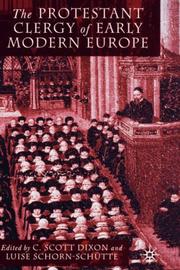
ISBN: 0333917766 Year: 2003 Publisher: Basingstoke Palgrave Macmillan
Abstract | Keywords | Export | Availability | Bookmark
 Loading...
Loading...Choose an application
- Reference Manager
- EndNote
- RefWorks (Direct export to RefWorks)
Clergy --- -Protestant churches --- -Reformation --- -Protestant Reformation --- Reformation --- Church history --- Counter-Reformation --- Protestantism --- Protestant sects --- Christian sects --- Clergy members --- Clergymen --- Indigenous clergy --- Major orders --- Members of the clergy --- Ministers (Clergy) --- Ministers of the gospel --- Native clergy --- Ordained clergy --- Ordained ministers --- Orders, Major --- Pastors --- Rectors --- Religious leaders --- Office --- -History --- History --- Europe --- Council of Europe countries --- Eastern Hemisphere --- Eurasia --- -Church history --- -Clergy --- Protestant churches --- History. --- -Office --- Office&delete& --- Clergy&delete& --- Diocesan clergy --- Ecclesiastics --- Secular clergy
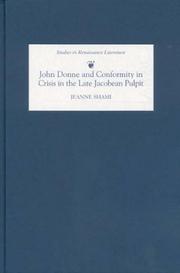
ISBN: 1280765453 9786610765454 1846150949 0859917894 Year: 2003 Publisher: Cambridge, UK ; Rochester, N.Y. : D.S. Brewer,
Abstract | Keywords | Export | Availability | Bookmark
 Loading...
Loading...Choose an application
- Reference Manager
- EndNote
- RefWorks (Direct export to RefWorks)
This book considers the professional contribution of John Donne to an emerging homiletic public sphere in the last years of the Jacobean English Church (1621-25), arguing that his sermons embody the conflicts, tensions, and pressures on public religious discourse in this period; while they are in no way 'typical' of any particular preaching agenda or style, they articulate these crises in their most complex forms and expose fault lines in the late Jacobean Church. The study is framed by Donne's two most pointed contributions to the public sphere: his sermon defending James I's Directions to Preachers and his first sermon preached before Charles I in 1625. These two sermons emerge from the crises of controversy, censorship, and identity that converged in the late Jacobean period, and mark Donne's clearest professional interventions in the public debate about the nature and direction of the Church of England. In them, Donne interrogates the boundaries of the public sphere and of his conformity to the institutions, authorities, and traditions governing public debate in that sphere, modelling for his audience an actively engaged conformist identity. Professor JEANNE SHAMI teaches in the Department of English at the University of Regina.
Christian literature, English --- Dissenters, Religious --- Clergy --- Sermons, English --- Clergy members --- Clergymen --- Diocesan clergy --- Ecclesiastics --- Indigenous clergy --- Major orders --- Members of the clergy --- Ministers (Clergy) --- Ministers of the gospel --- Native clergy --- Ordained clergy --- Ordained ministers --- Orders, Major --- Pastors --- Rectors --- Secular clergy --- Religious leaders --- History and criticism. --- History --- Donne, John, --- Donn, John, --- Done, John, --- Donn, Dzhon, --- Dann, Dzhon, --- Донн, Джон, --- Religion. --- England --- Church history --- Prose. --- Censorship. --- Charles I. --- Conformist Identity. --- Controversy. --- Ecclesiastical History. --- Identity. --- Jacobean English Church. --- James I. --- John Donne. --- Public Religious Discourse.

ISBN: 0804747687 0804747679 9780804747677 9780804747684 Year: 2003 Publisher: Stanford, Calif. Stanford University Press
Abstract | Keywords | Export | Availability | Bookmark
 Loading...
Loading...Choose an application
- Reference Manager
- EndNote
- RefWorks (Direct export to RefWorks)
Philosophical anthropology --- Religious studies --- Secularism. --- Islam and politics. --- Christianity and politics. --- Sécularisation --- Islam et politique --- Christianisme et politique --- Secularism --- Islam and politics --- Christianity and politics --- #SBIB:316.331H600 --- #SBIB:39A10 --- 291.7 --- Christianity --- Church and politics --- Politics and Christianity --- Politics and the church --- Political science --- Islam --- Politics and Islam --- Ethics --- Irreligion --- Utilitarianism --- Atheism --- Postsecularism --- Secularization (Theology) --- Secularisatie: algemeen --- Antropologie: religie, riten, magie, hekserij --- Acties op religieuze beweeggronden: godsdienstoorlogen; missiewerking; zending; fanatisme; religieuze propaganda; fundamentalisme --- Political aspects --- 291.7 Acties op religieuze beweeggronden: godsdienstoorlogen; missiewerking; zending; fanatisme; religieuze propaganda; fundamentalisme --- Sécularisation --- anthropology of the secular --- secularism --- concepts, practices and political formations of secularism --- the modern West and Middle East --- myth, taboo and religion
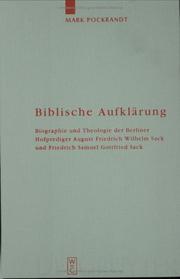
ISBN: 3110178362 3110908204 9783110178364 Year: 2003 Volume: 86 Publisher: Berlin de Gruyter
Abstract | Keywords | Export | Availability | Bookmark
 Loading...
Loading...Choose an application
- Reference Manager
- EndNote
- RefWorks (Direct export to RefWorks)
Mit seiner umfassenden und materialreichen Untersuchung leistet der Autor einen gewichtigen Beitrag zur Erforschung der theologischen Aufklärung in Deutschland, insbesondere der Neologie. Er untersucht Biographie und Theologie der beiden Hofprediger Sack vor dem Hintergrund der Auseinandersetzungen über Christentum (vs. La Mettrie), Abendmahl (vs. E. C. Koch; Streit um C. A. Heumann), Toleranz (vs. J. M. Goeze), Heterodoxie (vs. C. F. Bahrdt), Orthodoxie (vs. J. C. Wöllner), Spinozismus (vs. Schleiermacher) und die Union von Lutheranern und Reformierten. With this comprehensive study, the author presents an important contribution to research into the theological enlightenment in Germany, with particular reference to neology. He examines the biographies and theology of the two Court Preachers Sack against the background of the controversies surrounding Christianity (vs. La Mettrie), the Eucharist (vs. E. C. Koch; controversy about C. A. Heumann), tolerance (vs. J. M. Goeze), heterodoxy (vs. C. F. Bahrdt), orthodoxy (vs. J. C. Wöllner), Spinozism (vs. Schleiermacher) and the union of Lutherans and Reformed Protestants.
Clergy --- Theologians --- 2 SACK, AUGUST FRIEDRICH WILHEM --- 2 SACK, FRIEDRICH SAMUEL GOTTFRIED --- Godsdienst. Theologie--SACK, AUGUST FRIEDRICH WILHEM --- Godsdienst. Theologie--SACK, FRIEDRICH SAMUEL GOTTFRIED --- 2 SACK, FRIEDRICH SAMUEL GOTTFRIED Godsdienst. Theologie--SACK, FRIEDRICH SAMUEL GOTTFRIED --- 2 SACK, AUGUST FRIEDRICH WILHEM Godsdienst. Theologie--SACK, AUGUST FRIEDRICH WILHEM --- Christian theologians --- Scholars --- Clergy members --- Clergymen --- Indigenous clergy --- Major orders --- Members of the clergy --- Ministers (Clergy) --- Ministers of the gospel --- Native clergy --- Ordained clergy --- Ordained ministers --- Orders, Major --- Pastors --- Rectors --- Religious leaders --- Sack, August Friedrich Wilhelm, --- Sack, Friedrich Samuel Gottfried, --- Sack, A. W. F. --- Diocesan clergy --- Ecclesiastics --- Secular clergy --- Clergy - Germany - Berlin - Biography --- Theologians - Germany - Berlin - Biography
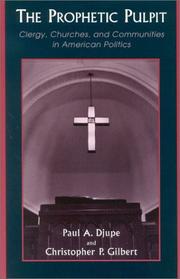
ISBN: 0585479380 9780585479385 0742511928 9780742511927 0742511936 9780742511934 Year: 2003 Publisher: Lanham, Md. Rowman & Littlefield
Abstract | Keywords | Export | Availability | Bookmark
 Loading...
Loading...Choose an application
- Reference Manager
- EndNote
- RefWorks (Direct export to RefWorks)
Clergy --- Christianity and politics --- Clergy members --- Clergymen --- Diocesan clergy --- Ecclesiastics --- Indigenous clergy --- Major orders --- Members of the clergy --- Ministers (Clergy) --- Ministers of the gospel --- Native clergy --- Ordained clergy --- Ordained ministers --- Orders, Major --- Pastors --- Rectors --- Secular clergy --- Religious leaders --- Political activity. --- Political activity --- Evangelical Lutheran Church in America --- Episcopal Church --- Protestant Episcopal Church in the U.S.A. --- Protestant Episcopal Church in the United States of America --- American Episcopal Church --- Protestant Episcopal Church --- Protestantlich-Bischöfliche Kirche der Vereinigten Staaten --- Protestant Episcopal Church in the Confederate States of America --- ELCA --- American Lutheran Church (1961-1987) --- Association of Evangelical Lutheran Churches (U.S.) --- Lutheran Church in America --- Commission for a New Lutheran Church --- ELCA (Evangelical Lutheran Church in America) --- North American Lutheran Church
| Listing 1 - 10 of 10 |
Sort by
|

 Search
Search Feedback
Feedback About UniCat
About UniCat  Help
Help News
News